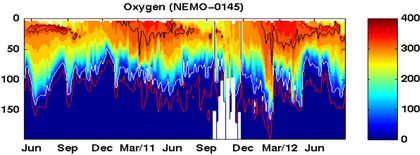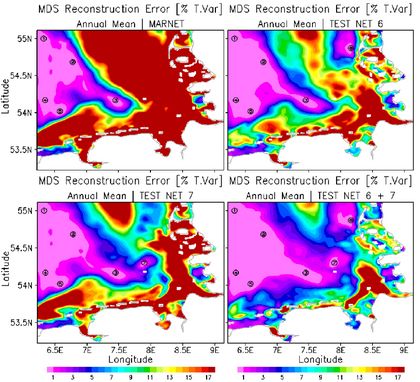Current projects
Key Area 1
- European COastal sea Operational observing and Forecasting system (ECOOP), EU
- Biogeochemie des Watts, DFG
- Impact of climate change and human intervention on hydrodynamics and environmental conditions in the Ems-Dollart estuary: an integrated data-modelling approach (Future Ems), on going (BMBF).
- Earth System Knowledge Platform (ESKP), on going (Helmholtz-Gemeinschaft)
Key Area 2
- ASSEssMent of the BLAck Sea sedimentary system since the last Glacial Extreme (ASSEMBLAGE), EU
- Southern European Seas: Assessing and Modelling Ecosystem Changes (SESAME), EU
- DFG, Priority Research Program “Mass Transport”, Project: Spatial and Temporal Resolution Limits for Regional Mass Transport and Mass Distribution (STREMP), 2006-2008
- EuroArgo, on going (Through Univ. Sofia, EU)
Research
Coastal Research
Research topics in the Coastal Research Group
Key Area 1: Coastal Oceanography
Coastal ocean is driven by different short and long-term natural influences and human activities, therefore conducting assessments of the state and sensitivity of the coastal ocean systems and their responses to natural and human influences is the first step to developing scenarios of sustainable use of coastal ocean. Studies in the Working Group use both theoretical approaches and data analysis. The basic tools used in the theory include numerical circulation and wave models coupled with biogeochemistry models. Observations which are analysed include data from tidal gauges, waverider buoys, HF-radars, FerryBoxes, and vertical profiles from scan fish. Satellite data from altimeters, MERIS, AVHRR and SAR are also used. Most of the research activities are focused on the synoptic description of coastal ocean and provide a methodological support to developing operational oceanography and advanced monitoring strategies. This is not a trivial task in the coastal ocean, which is characterized by different and variable topographies and coastal lines, as well as by a complex interplay betweenn waves, currents and boundary layers. The focal research areas include Wadden Sea, German Bight and the western Baltic Sea. Links with operational activities in the German Bight provide practical motivations to deepen the research in the field of application of science into operational practices.
Key Area 2: Regional Oceanography
Regional Oceanography applies research instruments used in the global ocean science to address specific issues characteristic for individual seas and parts of ocean. The experience and further research interests include tidal basins as the North Sea as well as all major European semi-enclosed seas (Baltic Sea, Black Sea and Mediterranean). The major research instrument is the numerical modeling. Of focal interest are processes of water mass formation, exchange through straits and inflow-outflow dynamics, biogeochemistry. The later is recently advanced due to using oxygen sensors installed on Argo floats.

Key Area 3: Data Assimilation
Research is concerned with developing models and algorithms, as well as data assimilation methods for the coastal ocean. Data (including model data) analysis by means of modern techniques is a prerequisite for a successful interpretation of observations and blending data into numerical models. Amongst them the major research interests is the assessment of observation systems and their improvement based on adaptive sampling. Potential applications of this research is in developing modern monitoring practices and products tailored to serve to the coastal ocean protection, shipping and other operations.




![[Translate to English:]](/f/5/_processed_/3/2/csm_ICBM-Logo-transparent-_91fe1c6774.png)